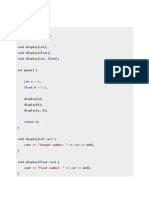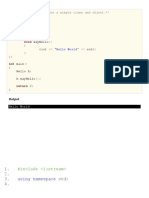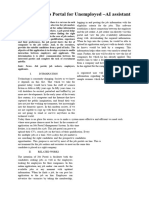0% found this document useful (0 votes)
11 views68 pagesOops Practical
The document contains multiple C++ programs demonstrating various object-oriented programming concepts such as class implementation, static data members, friend functions, inline functions, function overloading, constructors, destructors, inheritance (single, multilevel, multiple, and hybrid), and the use of the 'this' pointer. Each program includes a brief description of its functionality and sample output. The programs serve as practical examples for understanding fundamental OOP principles in C++.
Uploaded by
itsharshkumar775Copyright
© © All Rights Reserved
We take content rights seriously. If you suspect this is your content, claim it here.
Available Formats
Download as DOCX, PDF, TXT or read online on Scribd
0% found this document useful (0 votes)
11 views68 pagesOops Practical
The document contains multiple C++ programs demonstrating various object-oriented programming concepts such as class implementation, static data members, friend functions, inline functions, function overloading, constructors, destructors, inheritance (single, multilevel, multiple, and hybrid), and the use of the 'this' pointer. Each program includes a brief description of its functionality and sample output. The programs serve as practical examples for understanding fundamental OOP principles in C++.
Uploaded by
itsharshkumar775Copyright
© © All Rights Reserved
We take content rights seriously. If you suspect this is your content, claim it here.
Available Formats
Download as DOCX, PDF, TXT or read online on Scribd
/ 68






















































































